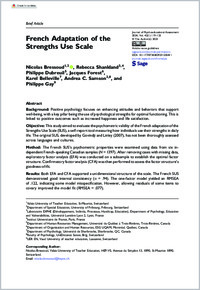French Adaptation of the Strengths Use Scale
Emotion, apprentissages et bien-être à l'école
- Bressoud, Nicolas ORCID HEP-VS
- Shankland, Rebecca
- Dubreuil, Philippe
- Forest, Jacques
- Belleville, Karel
- Samson, Andrea C. ORCID
- Gay, Philippe ORCID
- 2023
Published in:
- Journal of Psychoeducational Assessment. - 2023, vol. 42, no. 1, p. 119-125
English
Background: Positive psychology focuses on enhancing attitudes and behaviors that support well-being, with a key pillar being the use of psychological strengths for optimal functioning. This is linked to positive outcomes such as increased happiness and life satisfaction.
Objective: This study aimed to evaluate the psychometric validity of the French adaptation of the Strengths Use Scale (SUS), a self-report tool measuring how individuals use their strengths in daily life. The original SUS, developed by Govindji and Linley (2007), has not been thoroughly assessed across languages and cultures.
Method: The French SUS’s psychometric properties were examined using data from six in-dependent French-speaking Canadian samples (N = 1397). After removing cases with missing data, exploratory factor analysis (EFA) was conducted on a subsample to establish the optimal factor structure. Confirmatory factor analysis (CFA) was then performed to assess the factor structure’s goodness-of-fit.
Results: Both EFA and CFA supported a unidimensional structure of the scale. The French SUS demonstrated good internal consistency (α = .94). The one-factor model yielded an RMSEA of .122, indicating some model misspecification. However, allowing residuals of some items to covary improved the model fit (RMSEA = .077).
Objective: This study aimed to evaluate the psychometric validity of the French adaptation of the Strengths Use Scale (SUS), a self-report tool measuring how individuals use their strengths in daily life. The original SUS, developed by Govindji and Linley (2007), has not been thoroughly assessed across languages and cultures.
Method: The French SUS’s psychometric properties were examined using data from six in-dependent French-speaking Canadian samples (N = 1397). After removing cases with missing data, exploratory factor analysis (EFA) was conducted on a subsample to establish the optimal factor structure. Confirmatory factor analysis (CFA) was then performed to assess the factor structure’s goodness-of-fit.
Results: Both EFA and CFA supported a unidimensional structure of the scale. The French SUS demonstrated good internal consistency (α = .94). The one-factor model yielded an RMSEA of .122, indicating some model misspecification. However, allowing residuals of some items to covary improved the model fit (RMSEA = .077).
- Language
-
- English
- License
- Open access status
- gold
- Identifiers
- Persistent URL
- https://fredi.hepvs.ch/hepvs/documents/327746
Statistics
Document views: 72
File downloads:
- bressoud-et-al-2023-french-adaptation-of-the-strengths-use-scale: 133
